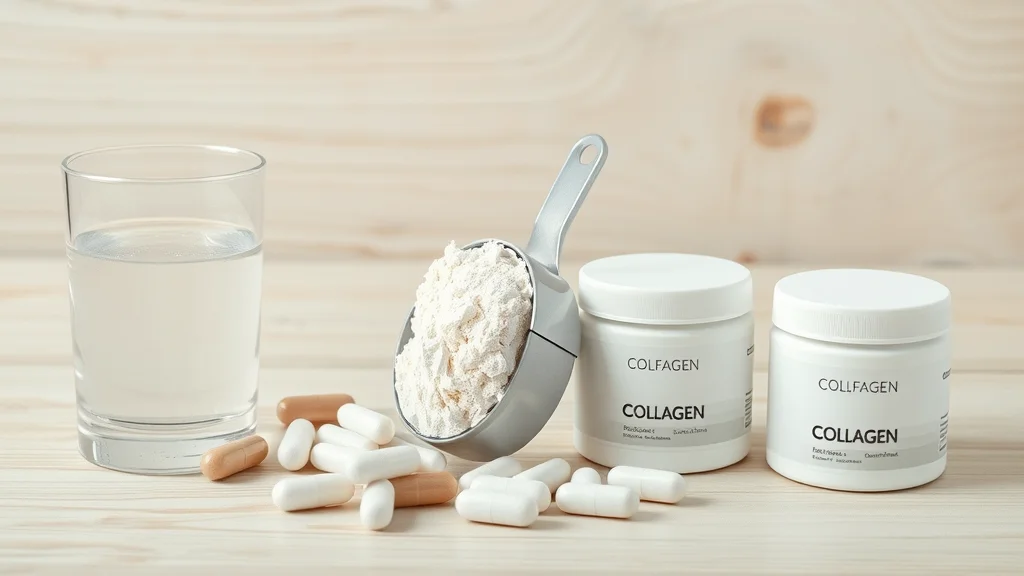Did you know that after the age of 25, your body produces 1% less collagen each year? This lesser-known fact is transforming how we think about skin health and beauty routines. Imagine a simple daily step that can help renew your skin’s firmness, glow, and youthful resilience — all by leveraging the collagen your body naturally craves. If you’ve ever wondered how celebrities or skincare enthusiasts maintain smooth, luminous skin, the secret may lie in unlocking the science of collagen. In this article, we’ll reveal the surprising truth about collagen benefits for skin, drawing on the latest evidence, expert perspectives, and practical guidance to help you make confident choices for your complexion.
Collagen Benefits for Skin: Surprising Facts Revealed

“Did you know that after the age of 25, your body produces 1% less collagen each year?”
When it comes to collagen benefits for skin, most people only scratch the surface. Beyond its well-known reputation for improving skin elasticity, collagen serves as a major building block for overall skin health. As collagen production wanes, visible signs like fine lines, wrinkles, and a loss of firmness become more pronounced. However, many are surprised at how deeply collagen affects everything from hydration to the skin’s ability to bounce back from damage. Recent human studies and expert reviews have fueled a renewed interest in harnessing collagen through lifestyle choices, dietary supplements, and skincare products.
A strong foundation in collagen production not only improves your skin’s structural integrity but also aids in retaining a youthful glow. Studies reveal that including collagen—whether through oral collagen supplements or topical applications—can boost skin hydration, smooth rough texture, and even reduce the notorious signs of aging. The science continues to evolve, but the message is clear: prioritizing collagen benefits for skin could be your next best beauty move.
How Collagen Production Declines with Age
The reduction of collagen in our bodies is both gradual and inevitable. After turning 25, your skin’s ability to regenerate and repair slows down as collagen production drops by about 1% each year. This steady decline results in a weakened skin barrier, more pronounced wrinkles, and a duller complexion. Coupled with factors like UV exposure, poor diet, and stress, the rate of collagen loss may accelerate, which poses further challenges for maintaining healthy, youthful-looking skin.
Clinically, this change manifests as decreased skin elasticity and thinning, making the skin susceptible to damage and environmental pollutants. The decline in collagen also leads to drier, less firm skin over time. Understanding how and when collagen diminishes can empower you to make timely decisions about taking collagen supplements or adjusting your lifestyle for improved skin health.
Increased fine lines and wrinkles appearing on the face and neck
Loss of skin firmness and sagging, especially around the jaw and cheeks
Diminished skin glow and radiance
Slower healing of minor skin injuries or irritations
Rough, uneven skin texture and higher sensitivity
What You'll Learn About Collagen Benefits for Skin
The main types of collagen and which support radiant skin
Different methods of supplementation: oral, topical, collagen peptides, and powders
Evidence from human studies proving collagen’s effectiveness
Expert opinions on supplement safety, dosage, and best practices
The real story behind common collagen myths and misconceptions
Understanding the Science: Collagen and Skin Health
To appreciate the full impact of collagen benefits for skin, it’s important to know what collagen actually is and why your skin relies on it. Collagen, a protein that makes up nearly one-third of the total protein in your body, provides structural support not only for skin but also for connective tissue, joints, cartilage, and even blood vessels. When it comes to your complexion, collagen forms a fibrous network in the dermis (the skin’s deepest layer), which is crucial for skin strength and elasticity.
As the body’s most abundant protein, collagen is created from amino acids like glycine, proline, and hydroxyproline. Its importance goes beyond simple aesthetics: collagen supports essential skin functions like tissue repair, moisture retention, and protection against environmental stressors. In short, your skin’s ability to look youthful largely depends on its collagen matrix, making the pursuit of better collagen production a top beauty and health priority.
What is Collagen?

Collagen is a robust and versatile protein in the body, acting as the scaffolding that keeps your tissues strong and flexible. Unlike other proteins, collagen’s unique triple-helix structure makes it durable and resistant to stretching. This is why it’s so vital for skin elasticity, preventing sagging and supporting that “snap-back” effect associated with youthful skin.
Common sources of collagen include animal-based foods like bone broth and fish, though the protein can also be derived from supplements. Whether ingested or applied, collagen must be broken down into smaller collagen peptides—short chains of amino acids—before the body can absorb and utilize them. Ultimately, the body makes use of these peptides by rebuilding and strengthening existing collagen fibers in the skin and other tissues.
How Collagen Benefits for Skin Are Linked to Overall Skin Health
The direct link between collagen benefits for skin and skin health is well established. A robust collagen matrix helps keep the dermis hydrated, full, and resistant to signs of aging. When collagen levels drop, skin hydration suffers, resulting in dryness, rough texture, and a less vibrant appearance.
Maintaining or enhancing collagen production is therefore key to supporting your body’s most visible organ. Alongside basic skin health, collagen is instrumental in wound healing, protection against sun-induced damage (sun protection), and resistance to the effects of oxidative stress. In short, a focus on collagen is a focus on comprehensive skin health.
Collagen Production: The Biological Perspective
Collagen synthesis is a dynamic, ongoing process influenced by age, genetic factors, diet, and lifestyle. Throughout youth, the body efficiently creates new collagen from amino acids procured through a balanced diet rich in protein. However, after age 25, natural collagen synthesis slows down, as highlighted earlier, increasing the need for dietary or supplemental support.
Environmental factors also play a significant role. UV rays, smoking, high sugar intake, and chronic stress are notorious for breaking down collagen fibers prematurely. Reinforcing your internal collagen network through collagen supplements (oral or topical), healthy habits, and minimizing exposure to damaging factors is essential for preserving optimal skin health.
Types of Collagen: Which Are Best for Skin?
There are at least 28 identified types of collagen, but just a handful predominantly influence skin quality. Understanding which types deliver the best collagen benefits for skin can optimize your supplement or skincare investment.
Types I, II, and III collagen are the most relevant to skin health. Type I is the most abundant, responsible for firmness and structure. Type III supports elasticity and is often found alongside Type I. Type II is more associated with joint health but can also play a minor role in skin’s supportive matrix. Choosing the right collagen type ensures effective results for smoother, more youthful skin.
Type I, II, and III Collagen for Skin Health

Type I collagen is your skin’s best friend, accounting for up to 90% of collagen in the dermis. It’s primarily responsible for structural integrity and the skin’s characteristic plumpness. Supplementing with Type I, particularly through collagen powder or hydrolyzed collagen peptides, has been shown in human studies to enhance both firmness and hydration.
Type III collagen works in tandem, supporting vascular structures within the skin and contributing to resilience and flexibility. Type II, meanwhile, is more common in cartilage but may offer additional benefits for those seeking joint health alongside better skin. Ultimately, products containing a blend of Types I and III are frequently recommended for the most noticeable improve skin effects.
Collagen Peptides vs. Collagen Powder: What’s the Difference?
Collagen peptides and collagen powder are often used interchangeably but differ in important ways. Collagen peptides come from enzymatically hydrolyzed collagen, which is broken down into smaller, bioavailable fragments—making it easier for the body to absorb. Collagen powder typically refers to a format (often containing peptides), ideal for mixing into hot or cold drinks and foods.
While both deliver amino acids necessary for rebuilding skin collagen, collagen peptides are absorbed more quickly, maximizing their benefits for skin renewal, skin hydration, and texture improvement. Some users prefer peptides for convenience and digestibility, while others enjoy the versatility of collagen powder products.
Comparison of Collagen Supplement Forms: Benefits and Efficacy | ||
Form |
Key Benefits |
Efficacy |
|---|---|---|
Collagen Peptides |
Highly bioavailable; supports fast absorption and skin elasticity |
Backed by human studies; rapid visible results in 4–8 weeks |
Collagen Powder |
Versatile use in food/drinks; rich in essential amino acids for skin, hair, and nails |
Effective if dosage and quality are high; slower absorption than peptides |
Topical Collagen |
Claims to moisturize and plump skin surface |
Limited true penetration; effects mainly surface-level |
Oral Collagen |
Supports full-body collagen production including connective tissue |
Clinically proven for sustained improve skin results |
Oral Collagen Supplement |
Easy daily use; shown to enhance skin hydration and firmness |
Strong evidence, especially with hydrolyzed forms |
Collagen Supplements: Do They Actually Improve Skin?
The market for collagen supplements is booming, but do these products deliver real results? Recent human studies show that consistent intake of quality oral collagen supplements can improve skin elasticity, reduce wrinkles, and amplify overall radiance. Collagen’s journey—whether from a pill, powder, or beverage—begins in the gut, where it is digested and broken into amino acids and peptides, then delivered to the skin via the bloodstream.
The science is clear: oral collagen supplements have measurable, dose-dependent effects on improve skin quality, unlike many topical alternatives. However, results depend on product quality, formulation, and consistency in use. Genuine improvement may require 4–12 weeks, but the transformative impact on skin hydration and firmness is worth the wait for many.
Oral Collagen Supplements for Skin Health

Oral collagen supplements—including collagen peptides and hydrolysate variants—deliver targeted amino acids directly to your body’s collagen factories. Unlike topical collagen (which struggles to penetrate deep into the dermis), these supplements work from within, replenishing lost collagen and fundamentally supporting skin health.
Researchers emphasize the importance of sourcing your supplements from reputable brands and sticking to a regular schedule. Oral collagen is broken down into peptides, which circulate to the skin, where they signal the body to ramp up natural collagen production. As a result, many users notice softer, plumper skin, with reduced irritation and dryness—a testament to the real-world benefits of collagen supplements.
Topical Collagen: Myth vs. Reality
In contrast to oral forms, topical collagen is marketed as a moisturizer and wrinkle-reducer. While many swear by topical collagen, clinical evidence favors oral collagen supplements for boosting skin health. This is because topical collagen molecules are generally too large to penetrate beyond the outermost layer of skin.
That said, topical collagen products may still provide value as surface moisturizers, helping trap moisture for temporary plumpness and a smooth finish. For those seeking true, long-lasting results, however, ingestible forms remain the gold standard.
“While many swear by topical collagen, clinical evidence favors oral collagen supplements for boosting skin health.”
Collagen Peptides: The Science Behind Faster Skin Renewal
Among supplement forms, collagen peptides stand out for their speed and effectiveness in skin repair. Because they’re already broken down into small, bioactive peptides, the body can absorb them quickly and direct them precisely where needed. Clinical research supports that collagen peptide products can enhance skin elasticity, reduce fine lines, and visibly boost skin hydration in a matter of weeks.
Optimal outcomes depend on a combination of a high-quality product, regular use, and adherence to recommended dosages—underlining the importance of diligent collagen supplement selection and routine.
Human Studies: Evidence Behind Collagen Benefits for Skin
Scientific skepticism has given way to excitement as a growing number of third-party studies confirm the efficacy of collagen for improving skin health. Robust human trials show that, after 8–12 weeks of supplementation, participants experienced measurable improvements in skin elasticity, skin hydration, and wrinkle depth. These results appear more pronounced in women over 35 and those with UV-damaged or mature skin.
Although not a “miracle cure,” the collective evidence suggests that a sustained regimen of oral collagen supplement can make a visible difference. By increasing the available pool of amino acids in the skin, the body is equipped to rebuild and reinforce collagen fibers from within.
Top Human Studies: Collagen Benefits for Skin | ||
Study |
Key Findings |
Duration |
|---|---|---|
Proksch et al., 2014 |
Significant improvement in skin elasticity and reduction in wrinkles with collagen peptides |
8 weeks |
Choi et al., 2019 |
Increased skin hydration and smoother texture from daily oral collagen capsules |
12 weeks |
Asserin et al., 2015 |
Higher dermal collagen density and improved skin firmness following oral supplementation |
12 weeks |

How Reliable Are These Human Studies on Collagen Benefits for Skin?
While enthusiasm for collagen is high, it’s crucial to scrutinize the methodology and size of supporting studies. Most reputable trials are double-blind, placebo-controlled, and peer-reviewed, lending credibility to claims about collagen benefits for skin. However, variations in dosage, collagen type, and participant demographics mean not all results are universal.
Despite some limitations, the weight of evidence strongly supports collagen’s positive effects on skin health. Going forward, look for products referenced in clinical research, ensure they provide evidence-based dosage, and monitor your own results for best outcomes.
“Peer-reviewed research increasingly supports collagen’s powerful influence on skin appearance.”
Taking Collagen: How and When for Maximum Skin Benefits
Maximizing collagen benefits for skin involves more than just selecting the right product. Your habits, dosage, timing, and even what you pair the supplement with can influence how well your body absorbs and utilizes collagen. Consistency is the golden rule for seeing the first changes in skin elasticity, glow, and firmness.
For most adults, the ideal time to take collagen is in the morning with vitamin C (to support collagen synthesis) or in the evening for convenience. Taking collagen with a meal, rather than alone, often enhances absorption and utilization by supplying complementary nutrients.
Best Practices for Taking Collagen Supplements

For noticeable collagen benefits for skin, aim for a daily routine built on trust and reliability. This means:
Choosing high-quality, hydrolyzed collagen peptides or reputable collagen supplements
Combining collagen with supporting nutrients (especially vitamin C)
Setting regular reminders to maintain consistency
Monitoring your skin for measurable improvements in texture, hydration, and glow
Integrating collagen into your routine may be as simple as mixing collagen powder into your morning smoothie, coffee, or even soup. Use a supplement tracker or schedule to make adherence effortless.
Dosage, Timing, and Absorption: Unlocking Optimal Collagen Benefits for Skin
Most human studies recommend a daily intake of 2.5–10 grams of hydrolyzed collagen peptides for visible benefits. Split dosages may improve absorption, but even a single daily dose is beneficial if consistently maintained.
Enhancing absorption depends on digestive efficiency and the presence of pairing nutrients. For example, combining collagen with vitamin C and maintaining a balanced diet rich in amino acids optimizes the impact. Avoiding excessive sugar and processed foods—the known collagen “breakers”—makes both supplements and your natural production more effective.
“Consistency is the key to noticing true collagen benefits for skin.”
Personal Insights: My Experience with Collagen Benefits for Skin
After learning about the science and clinical support behind collagen, I decided to try a reputable collagen peptide product daily. Within the first month, I observed my skin becoming noticeably more hydrated, plumper, and subtly brighter. Gradual improvements became increasingly evident as the routine continued—proving firsthand that consistent collagen supplement use can yield real-world results.
The changes, while not overnight, were significant enough to prompt friends to ask about my skincare secrets. My experience echoes what experts and human studies suggest: patient, persistent use of premium supplements pays off in glow, resilience, and firmness.
Before and After: Noticing the First Signs of Collagen Working

Comparing photos from before I started my collagen journey to three months later, the differences were not just in my imagination. Lighting and conditions aside, my skin appeared smoother, less lined, and retained more moisture throughout the day. Makeup sat better, and the overall clarity had improved.
Enhanced skin glow and a natural-looking radiance
Greater firmness, especially in the cheek and jawline area
Increased hydration lasting throughout the day
Refined texture, with fewer rough patches or dry spots
Ultimately, real-world results demonstrate that collagen benefits for skin are achievable, provided expectations are realistic and the routine is maintained.
Common Myths and Misconceptions About Collagen Benefits for Skin
Despite mounting scientific proof, several myths persist about collagen. Some believe topical applications are just as effective as oral forms, or that only supplements can deliver results. Let’s clarify these concerns with evidence and clinical perspective.
Myth: “Collagen can only be obtained from supplements.”
Truth: While supplements are convenient, dietary sources—like fish, bone broth, and protein-rich foods—also contribute to natural collagen production.Myth: “Topical collagen works as well as oral supplements.”
Truth: Topical collagen is primarily a moisturizer; it doesn’t penetrate the skin’s deeper layers like oral forms do.Myth: “All collagen supplements are the same.”
Truth: Sourcing, type (I vs. III), and manufacturing quality significantly affect the efficacy of collagen supplements. Always choose trusted brands.

Expert Opinions: Dermatologists Weigh in on Collagen Supplementation
“Collagen peptides have demonstrated measurable benefits in clinical trials, but product quality matters.” – Dr. Carter, Dermatologist
Dermatologists increasingly recommend collagen supplements for mature skin, post-menopausal women, and individuals with increased environmental exposure. They warn, however, that supplement quality, ingredient transparency, and third-party testing are vital to avoid misleading claims or contamination. Regular consultation with a healthcare provider ensures that your chosen collagen fits your unique needs and health profile.
Specialists also emphasize pairing collagen with sun protection, antioxidant-rich foods, and a steady, healthy lifestyle for the best results. Taking collagen isn’t a cure-all but should be a component of a holistic approach to skin health.
Collagen Supplement Recommendations and Safety Tips

When choosing a collagen supplement, look for:
Hydrolyzed (pre-broken-down) forms for maximum absorption
Clear labeling of type (preferably Types I and III for skin health)
No artificial additives, fillers, or heavy metals (check for third-party certification)
Reputable brands with published research or testimonials
Safety tips include starting with a lower dosage to monitor tolerance, informing your doctor of new supplements (especially for those with allergies, sensitivities, or taking medications), and maintaining proper hydration to support the body’s ability to utilize amino acids for new collagen synthesis.
Collagen Benefits for Skin: Potential Drawbacks, Side Effects & Cautions
Like any supplement, collagen powder and related products may present risks for certain users. These are usually mild, but it’s vital to be aware of who may need to avoid collagen or adjust usage.
Some people may experience digestive disturbances (such as bloating or upset stomach), especially when first starting. Rarer side effects include allergic responses, often related to the source (e.g., marine collagen for those with fish allergies). Diligent label reading and, when in doubt, professional medical guidance are best.
Possible Adverse Reactions and Their Management

The vast majority of users tolerate collagen well, but being informed adds to your safety. Gradually introducing supplements, monitoring for any new symptoms, and reviewing key ingredients can help you avoid unwanted effects. If you experience a reaction, discontinue use and consult your healthcare provider.
Who Should Avoid Collagen: Anyone with known allergies to fish, shellfish, eggs, or bovine ingredients, unless the product is plant-based or vegan-approved.
Allergy Considerations: Choose “clean label” and allergen-free supplements if sensitive.
Medication Interactions: Check with your doctor if you are on blood thinners or other regular medications.
People Also Ask: Collagen Benefits for Skin
What does taking collagen do for your face?
Taking collagen can rejuvenate facial skin by boosting its elasticity, plumping up areas prone to fine lines and sagging, and supporting a more youthful appearance overall. Regular use stimulates the body to repair and strengthen connective tissue in the face, leading to visibly firmer, better-hydrated skin over time. Many users also report increased softness and a healthier glow, underscoring collagen’s multi-faceted role in complexion care.
What happens to your body when you start taking collagen?
When you introduce collagen into your routine, your body absorbs and distributes the resulting amino acids wherever they’re needed most—from skin and joints to hair and nails. This can translate to more resilient connective tissue, stronger hair, better joint comfort, and a noticeable difference in overall hydration and suppleness. Over several weeks, consistent collagen intake replenishes your amino acid reserves, promoting renewal from the inside out.
Will collagen make my skin glow?
Yes, improved skin glow is one of the most sought-after results of collagen supplementation. By supporting moisture retention and cellular turnover, collagen helps the skin remain hydrated and radiant. The glow you see often reflects both increased water content in the dermis and the skin’s renewed capacity for repairing itself. However, results also depend on supplement quality, absorption, and overall consistency in usage.
What are the first signs that collagen is working?
Within the first 4–8 weeks of supplementation, many users observe increased moisture, subtle firmness, and a reduction in fine lines—particularly around the eyes and forehead. Additional signs include improved smoothness and a gentle glow, as the skin’s barrier becomes better equipped to retain water and resist damage. Patient observation and photo comparisons can help you notice these early, affirmative changes.
FAQs on Collagen Benefits for Skin
How long to see results from collagen supplements?
Most people report visible results within 4–12 weeks, with full improvements in hydration, firmness, and glow becoming clear through continued use.Are there vegan collagen sources for skin?
While true collagen is animal-derived, some plant-based products contain “collagen-boosters”—amino acids and nutrients that support the body’s own production of collagen rather than providing collagen directly.Which age is best to start collagen supplementation?
Experts recommend beginning a supplemental regimen in your late 20s to early 30s for maintenance, though it’s never too late to start if you’re seeking to restore or preserve skin health.
Key Takeaways on Collagen Benefits for Skin
Scientific evidence and human studies show that collagen boosts skin elasticity, firmness, and hydration.
Personal experience, echoed by many users, supports visible improvement in skin’s glow, smoothness, and resilience with consistent use.
Experts recommend hydrolyzed collagen peptides or powder from reputable sources for the best results.
Potential side effects are rare and mild; attention to sourcing and safety is critical.
Look for Types I and III collagen, and pair supplementation with a healthy lifestyle and balanced diet for optimal outcomes.
Ready to Transform Your Skin? Try Collagen Supplementation Today
Are you ready to unlock brighter, firmer, and healthier skin? Start your collagen journey today by choosing quality supplements and committing to a consistent routine!
 Add Row
Add Row  Add
Add 




Write A Comment